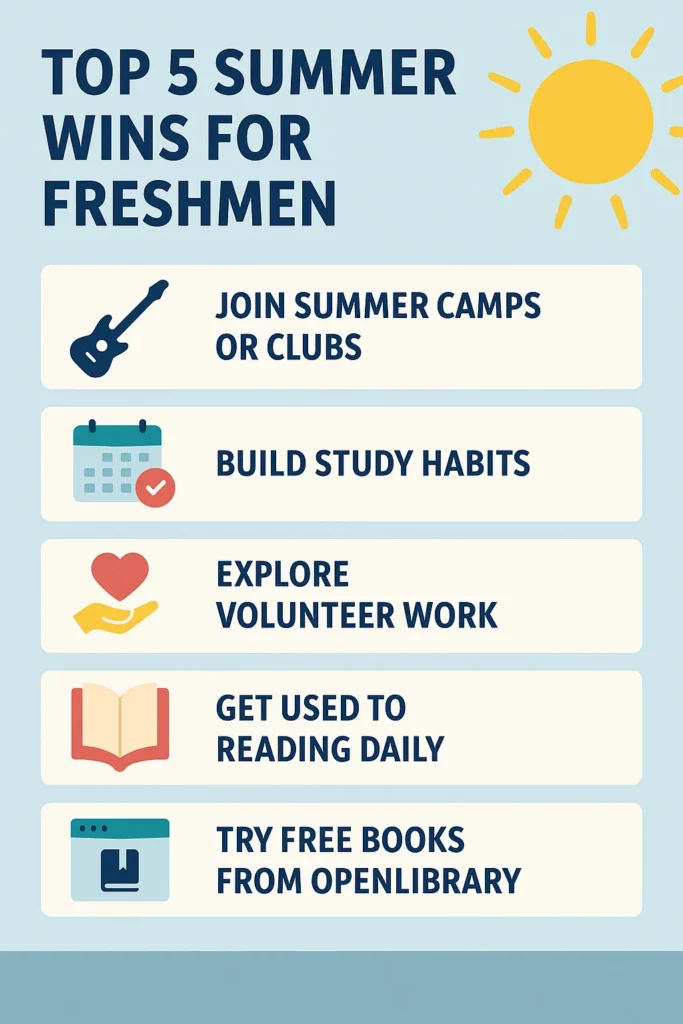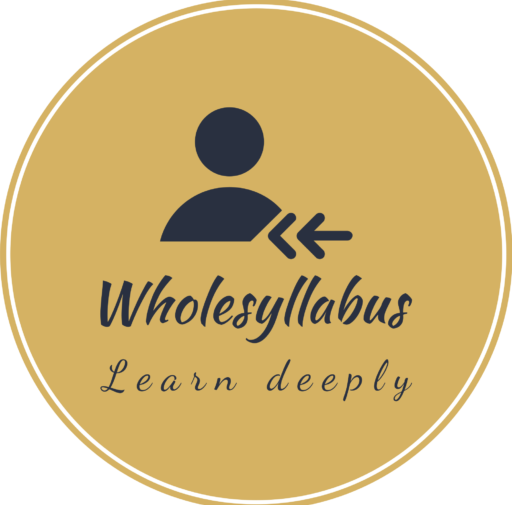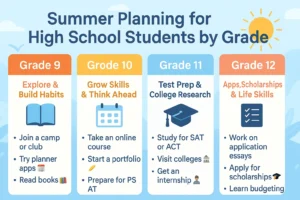Here’s what I realized after browsing Reddit, Quora, and a few .edu resources — smart summer planning makes your school year 10x less stressful.
It’s easy to see summer as a total break. But for high schoolers, a little intention during June–August can go a long way. Whether you’re a rising freshman or prepping for college apps, using summer wisely helps you hit the ground running when school starts.
This breakdown is part of our comprehensive summer prep series for high school students, helping you make the most of your break.
Miss summer planning and you’ll be scrambling during college app season.
Plan it well? You’ll thank yourself every semester.
The key? Each grade has its own priorities. A ninth-grader doesn’t need to be stressing over college essays yet, while a rising senior probably should. This guide breaks things down by grade, so you can focus on what matters now — not everything all at once.
📎 Helpful Resource:
College Planning Checklists by Grade – CollegeBoard
✅ Grade 9: Explore, Experiment, and Build Habits
Freshman year? Don’t stress. But don’t sleep on it either.
Summer before 9th grade isn’t about overloading your schedule — it’s about setting a strong foundation. This is your chance to explore new interests, build confidence, and create habits that will carry you through high school and beyond.

🎯 Freshman Summer Checklist
- ✅ Join a summer camp or club
Whether it’s STEM, writing, art, or music, find something that sparks your curiosity. These early experiences shape your path later.
→ Look for local camps or free online options like Khan Academy’s enrichment classes. - ✅ Build study habits
Try simple tools like Notion or MyStudyLife to practice planning out your days. Even 20 minutes a day helps. - ✅ Start volunteering
Volunteering early builds empathy, responsibility, and a great resume.
→ Find opportunities on VolunteerMatch.org - ✅ Read for fun
Build a reading habit before school gets hectic. Pick books that interest you, or explore OpenLibrary.org for free access.
💬 Reddit Insight:
“My son did a 2-week coding bootcamp before 10th grade. It boosted his confidence like crazy.” — Reddit user, r/ApplyingToCollege
Use smart tools to study better this summer.
✅ Grade 10: Build Skills & Start Thinking Long-Term
Sophomore summer is a sweet spot. You’re not new to high school anymore, but you’ve still got time before the college crunch. Now’s the moment to build skills, try new things, and start tracking your growth.
🎯 Sophomore Summer Checklist
- ✅ Take an online class or MOOC
Use platforms like edX or Coursera to explore topics you won’t learn in school — from entrepreneurship to data science. - ✅ Start a blog, YouTube channel, or digital portfolio
Document what you’re learning or doing this summer. It’s a great way to develop creativity and showcase your voice over time. - ✅ Prep for the PSAT
It’s not high-stakes yet, but familiarizing yourself with the PSAT (using free CollegeBoard tools) sets you up for success in junior year. - ✅ Track your extracurriculars
Start a spreadsheet or use Notion to list activities, awards, and hours. Trust us — future you will thank you during college app season.
💬 Real-World Example (Quora):
“My daughter started journaling her activities on Notion in 10th grade. Helped a TON with college apps.” — Parent on Quora
Check out our roundup of free summer courses by subject and grade—perfect for middle and high school students.
✅ Grade 11: Test Prep + College Research = Big Wins
If you’re heading into 11th grade, this is your summer to step up.
Junior year is big. It’s when colleges start paying close attention — and your choices this summer can set the tone for the rest of high school. But it’s not about being perfect. It’s about using your time on purpose.
🎯 Junior Summer Checklist
- ✅ Start SAT or ACT prep (just a little goes a long way)
The best prep isn’t cramming — it’s consistent, bite-sized practice.
→ Khan Academy’s SAT tool is free, tailored to your strengths, and backed by CollegeBoard. Try 20 minutes a few times a week. - ✅ Make a rough list of colleges
Think location, size, cost, and vibe — not just rankings.
→ College Scorecard shows real stats: grad rates, average student debt, and post-grad earnings. - ✅ Visit a campus (or tour online)
You don’t need to fly across the country. Visit a nearby college just to see what a dorm or lecture hall feels like. Or take a virtual tour — many schools offer them free. - ✅ Apply for something real
A summer internship. A lab shadowing gig. A part-time job. Even a volunteer spot with structure.
The key? Ask. Email politely. Follow up once.
→ Try local nonprofits, businesses, or university research labs.
💬 From Reddit:
“My kid emailed 20 local labs and landed a shadowing gig. Most teens don’t even ask — but one ‘yes’ can open doors.” — r/ApplyingToCollege
This kind of initiative says more to colleges than a perfect GPA.
✅ Grade 12: Get Ahead on College Apps, Scholarships, and Life Skills
Senior year starts fast — and college deadlines don’t wait.
If you’re heading into 12th grade, now’s the time to get ahead. The more you knock out in summer, the less pressure you’ll feel in the fall. And no — you don’t need to do everything. Just focus on what will actually move you forward.
🎯 Senior Summer Checklist
- ✅ Start your college essays (yes, now)
You don’t need a final draft yet. But getting your ideas out early can save you weeks of stress.
→ Start with Common App prompts and write one rough draft — no pressure, just get words on the page. - ✅ Create your FSA ID and learn FAFSA basics
You’ll need a Federal Student Aid ID to apply for college financial aid. Set it up now, so you’re not scrambling later. Look at FAFSA guides or even quick YouTube explainers. - ✅ Apply for scholarships
You don’t have to wait for senior year to begin. Many national scholarships open in the summer.
→ Use Fastweb or Scholarships.com and apply to a few each week. - ✅ Learn life skills you’ll need next year
Basic budgeting. Making your own meals. Writing a proper email. These things matter — in college and beyond.
Forum Wisdom:
“I finished my Common App essay in July. By October, I was helping friends who hadn’t even started. That early start saved me so much stress.” — College Confidential user
That’s the power of a head start. You get to enjoy your senior year without panic mode.
Ready to earn AND learn this summer?
Teens can start legit online tutoring—even at 14!
👉 Check out our full guide on online tutoring jobs for teens
Bonus: Summer Ideas for All Grades (9–12)
No matter what grade you’re in, a few smart summer moves can pay off big later.
You don’t need a perfect plan — just pick one or two things that push you a little outside your comfort zone. These ideas work across all grades and interests.
💡 Try This:
- ✅ Get a part-time job or internship
Learn how to manage your time, handle responsibility, and maybe earn a little money. It also looks great on future applications.
→ Start with the BLS Youth Jobs Guide - ✅ Learn a digital skill like AI tools or coding
You don’t need to become an expert — just get curious. Try Python, Canva, ChatGPT, or video editing.
→ Free tutorials on YouTube, Codecademy, or Khan Academy - ✅ Start a passion project or travel journal
Whether it’s photography, cooking, writing, or documenting a family trip — it all counts. Bonus: it’s a great conversation starter on college essays. - ✅ Cut back on screen time (just a little)
Try setting limits that feel doable. For example: no phone at meals, or 1 hour of creative work before scrolling. - ✅ Look into academic or leadership camps
National programs like NSLC offer exposure to fields like medicine, business, or law — and can boost your confidence, too.
Still wondering if summer is truly valuable? Here’s why summer matters for high school students’ growth and success.
❓ FAQs On Summer Planning by Grade (9–12)
Q1: What are some productive activities for high school students during summer?
A: Engaging in internships, volunteering, attending workshops, or taking online courses can be beneficial. These activities not only enhance your resume but also provide real-world experience.
Q2: How can I balance relaxation and productivity during summer?
A: Create a flexible schedule allocating time for both leisure and goal-oriented tasks. Prioritize activities that align with your interests and future aspirations.
Q3: Are there affordable resources for SAT/ACT preparation?
A: Yes, platforms like Khan Academy offer free prep courses. Additionally, many libraries provide access to test prep books and materials.
Q4: How important is volunteering in high school?
A: Volunteering showcases commitment and a sense of responsibility. It provides insight into community needs and can influence career choices.
Q5: When should I start working on college applications?
A: It’s advisable to begin in the summer before your senior year. This allows ample time to research colleges, gather recommendations, and draft essays.
Final Thoughts: Don’t Waste Summer — Use It Smartly
You don’t have to fill every hour. But if you use your summer intentionally, even a little, you’ll feel the benefits all year long.
Start small. Start smart. And make it count — on your terms.
- 📥 Download all grade-specific summer checklists as a printable PDF
Perfect for printing, checking off, or sticking on the fridge. - 🔗 Explore more free tools and planners on WholeSyllabus.com
We’ve got study tools, GPA calculators, AP prep, and more.

Nawab, an educator teaching K-12 since 2010, holds an English honors graduate degree and a diploma in elementary education. He has also been blogging for five years, sharing insights for educators and parents.

